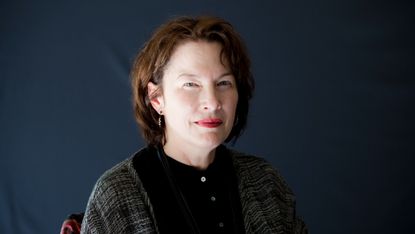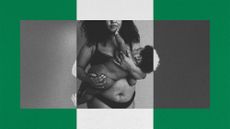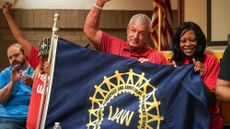Alice Sebold, Lucky and the man wrongfully convicted of her rape
Anthony Broadwater cried ‘tears of joy and relief’ after being exonerated following 16 years in prison

Bestselling US author Alice Sebold has apologised for her part in the wrongful conviction of a man exonerated last week of raping her 40 years ago.
Anthony Broadwater, who spent 16 years in prison, was jailed in 1982 after he was found guilty of raping Sebold when she was a first-year student at Syracuse University the previous year.
Sebold, 58, is best known for her 1999 memoir Lucky, which details her experience of being raped by a stranger, and the 2002 novel The Lovely Bones, an award-winning supernatural thriller about a teenage girl who is raped and murdered.
Subscribe to The Week
Escape your echo chamber. Get the facts behind the news, plus analysis from multiple perspectives.

Sign up for The Week's Free Newsletters
From our morning news briefing to a weekly Good News Newsletter, get the best of The Week delivered directly to your inbox.
From our morning news briefing to a weekly Good News Newsletter, get the best of The Week delivered directly to your inbox.
Lucky sold more than a million copies and “kicked off her career as an author”, said Variety. The Lovely Bones sold ten million copies and was adapted into an Oscar-nominated film directed by Peter Jackson and starring Saoirse Ronan.
Shoddy conviction
In Sebold’s memoir, she details spotting a black man who she believes is her rapist months after the attack. “He was smiling as he approached. He recognised me. It was a stroll in the park to him; he had met an acquaintance on the street,” she wrote.
Sebold said that she went to police, where an officer suggested that “it must have been Broadwater, who had supposedly been seen in the area”, the Los Angeles Times reported.
Sebold initially failed to identify Broadwater in a police lineup, but later identified him in court.
In a hearing on 22 November, William J. Fitzpatrick, the district attorney of Onondaga County, New York State, noted that such witness identifications of strangers are often unreliable, particularly when they cross racial lines – as was the case for Sebold, a white woman, and Broadwater, a black man.
Broadwater, who was 20 years old at the time of his imprisonment, was convicted largely based on two pieces of evidence: Sebold identifying him as the perpetrator, and microscopic hair analysis which tied him to the crime. Such analysis “is now considered junk science by the US Department of Justice”, said the Associated Press (AP).
After finishing his prison term in 1999, Broadwater, now 61, remained on New York’s sex offender registry and faced years of shame and isolation as a result.
Even after starting a relationship with a woman who believed in his innocence, the stigma of Broadwater’s conviction put him off ever having children. He told AP that the conviction “blighted his job prospects and his relationships with friends and family members”.
Film adaptation leads to exoneration
In 2019, a film adaptation of Lucky was announced, with 13 Reasons Why’s Karen Moncrieff on board to write and direct. Two years later, in May 2021, Variety revealed that Victoria Pedretti, the star of major Netflix hit You, had been chosen to play the role of Sebold.
However, plans for the movie were dropped after it lost its financing and executive producer Timothy Mucciante began to question Sebold’s memoir. “I started having some doubts, not about the story that Alice told about her assault, which was tragic, but the second part of her book about the trial, which didn’t hang together,” he told The New York Times.
After dropping out of the project, Mucciante hired a private investigator to look into the evidence against Broadwater. He realised that it didn’t stand up and brought the results to a lawyer. “That lawyer, David Hammond, wound up representing Broadwater successfully in court,” the Los Angeles Times said.
Broadwater had maintained his innocence throughout and on 22 November, a state judge, his lawyers and the district attorney agreed that his case had been “woefully flawed”, The New York Times reported.
Upon hearing the news that his conviction had been overturned, Broadwater cried “tears of joy and relief”, he told the AP.
“I’m not going to sully these proceedings by saying, ‘I’m sorry,’” Fitzpatrick, the district attorney, said in court. “That doesn’t cut it. This should never have happened.”
Sebold’s apology
Broadwater told The New York Times last week that he was hoping and praying for an apology from Sebold. “I sympathise with her,” he added. “But she was wrong.”
Just over a week later, in a statement posted on the blogging platform Medium, the author has acknowledged the role she “unwittingly played within a system that sent an innocent man to jail”.
“My goal in 1982 was justice – not to perpetuate injustice,” she wrote. “And certainly not to forever, and irreparably, alter a young man’s life by the very crime that had altered mine.”
On Tuesday, in a statement shared on the business-to-business platform Publishers Lunch, Simon & Schuster and its imprint Scribner announced that they would stop publishing Lucky in all formats “following the recent exoneration of Anthony Broadwater, and in consultation with the author”.
Create an account with the same email registered to your subscription to unlock access.
Sign up for Today's Best Articles in your inbox
A free daily email with the biggest news stories of the day – and the best features from TheWeek.com
Kate Samuelson is the newsletter editor, global. She is also a regular guest on award-winning podcast The Week Unwrapped, where she often brings stories with a women’s rights angle. Kate’s career as a journalist began on the MailOnline graduate training scheme, which involved stints as a reporter at the South West News Service’s office in Cambridge and the Liverpool Echo. She moved from MailOnline to Time magazine’s satellite office in London, where she covered current affairs and culture for both the print mag and website. Before joining The Week, Kate worked as the senior stories and content gathering specialist at the global women’s charity ActionAid UK, where she led the planning and delivery of all content gathering trips, from Bangladesh to Brazil. She is passionate about women’s rights and using her skills as a journalist to highlight underrepresented communities.
Alongside her staff roles, Kate has written for various magazines and newspapers including Stylist, Metro.co.uk, The Guardian and the i news site. She is also the founder and editor of Cheapskate London, an award-winning weekly newsletter that curates the best free events with the aim of making the capital more accessible.
-
 Nigeria's worsening rate of maternal mortality
Nigeria's worsening rate of maternal mortalityUnder the radar Economic crisis is making hospitals unaffordable, with women increasingly not receiving the care they need
By Harriet Marsden, The Week UK Published
-
 'Elevating Earth Day into a national holiday is not radical — it's practical'
'Elevating Earth Day into a national holiday is not radical — it's practical'Instant Opinion Opinion, comment and editorials of the day
By Harold Maass, The Week US Published
-
 UAW scores historic win in South at VW plant
UAW scores historic win in South at VW plantSpeed Read Volkswagen workers in Tennessee have voted to join the United Auto Workers union
By Peter Weber, The Week US Published